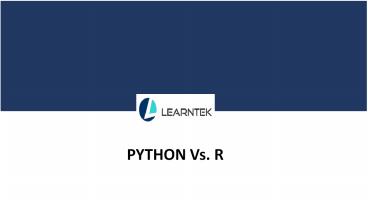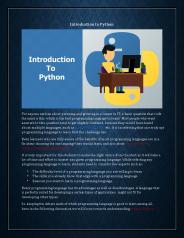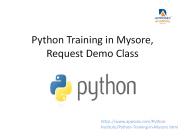Python vs. R - PowerPoint PPT Presentation
Title:
Python vs. R
Description:
Learntek is global online training provider on Big Data Analytics, Hadoop, Machine Learning, Deep Learning, IOT, AI, Cloud Technology, DEVOPS, Digital Marketing and other IT and Management courses. – PowerPoint PPT presentation
Number of Views:442
Title: Python vs. R
1
PYTHON Vs. R
2
Python vs. R
- Python vs. R
- R and Python are the most popular programming
languages used by data analysts and data
scientists. Both are free and open source and
were developed in the early 1990sR for
statistical analysis and Python as a
general-purpose programming language. - In the first, I will cover the vital aspect of
python language after that covers important
aspect in R language. - About Python
- Python is a high-level, interpreted,
general-purpose programming language. - Python programming language has been created by
Guido van Rossum in 1991.
Copyright _at_ 2019 Learntek. All Rights Reserved.
3
-
-
Guido van Rossum (Inventor of
Python)
Copyright _at_ 2019 Learntek. All Rights Reserved.
4
- Benefits of Python include
- It is open source, freely available, and quite
stable. - Python is a simple, minimalistic and
straightforward language. Reading a good Python
program feels almost like reading English and it
is so easy to work with and understand. - Python is easy to learn, although you are not a
trained, programmer. You can begin working with
the Python language it just takes a bit of
patience and a lot of practice. - The Python resource library is one of the best
among programming languages. - Python allows scaling even the most complex
applications with ease. - In data mining, big data and automation platforms
are depend on Python. It is the perfect language
to work with for general purpose tasks.
Copyright _at_ 2019 Learntek. All Rights Reserved.
5
- Python is used for a more productive coding
environment than massive languages like C and
Java. Experienced coders tend to stay more
organized and productive when working with
Python, as well. - Python provides us a Django, which is an open
source web application framework. These
frameworks like Ruby on Rails can be used to
simplify the development process. - It has a massive support base thanks to the fact
that it is open source and community developed.
Millions of like-minded developers work with the
language on a daily basis and continue to improve
core functionality. The latest version of Python
continues to receive enhancements and updates as
time progresses.
Copyright _at_ 2019 Learntek. All Rights Reserved.
6
- The main reasons why Python is mainly used in the
research and scientific communities is because
of its ease of use and simple syntax which makes
it easy to adapt for the people who have an
non-engineering background. It is also more
suited for quick prototyping. Another reason that
could explain the popularity of Python is that
most online courses on data science and machine
learning as pushing Python because it is easy to
use for beginners.
Copyright _at_ 2019 Learntek. All Rights Reserved.
7
- Learn python Advanced Python Training
- Ease of Libraries Python comes with many inbuilt
libraries for data science, machine learning and
artificial intelligence. Some of the most popular
libraries are Pandas (for Data Science), Pytorch,
TensorFlow (high-level neural network library for
deep learning), scikit-learn (for data mining,
data analysis and machine learning), matplotlib,
seaborn, scikit (data visualization), etc. Thanks
to Pythons popularity, there are numerous
resources machine learning and data science
tutorials out there where Python libraries are
utilized. Plenty of tutorials are readily
available online as well.
Copyright _at_ 2019 Learntek. All Rights Reserved.
8
- Many times, researchers build their own libraries
and upload them on GitHub or similar platforms so
that others can use them. The developer community
support and a plethora of features are what make
Python suitable for machine learning
applications. On the other hand, Java was mostly
built for general programming, not number
crunching, a field where R and Python are more
preferred.
Copyright _at_ 2019 Learntek. All Rights Reserved.
9
- Python provides us readymade library (Packages)
to perform the various operation on data. With a
single line of code, you can do the different
complex operation on data. If you use the java,
then you will have to write lines of code to
perform the specific task, whereas in python we
can call the inbuilt function. Python is a
compelling programming language used for many
different applications. Over time, the massive
community around this open source language has
created quite a few tools to effectively work
with Python. In recent years, many tools have
been built specifically for data science. As a
result, analyzing data with Python has never been
easier.
Copyright _at_ 2019 Learntek. All Rights Reserved.
10
- For data science, python provides us with robust
library packages such as Pandas, NumPy and
Matplotlib. Pandas is one of the vital Library in
python to do data analysis. It used for
everything from importing data from Excel
spreadsheets to processing sets for time-series
analysis. Pandas put pretty much every common
data munging tool at your fingertips. Pandas is
built on top of NumPy, one of the earliest
libraries behind Pythons data science success
story. NumPys functions are exposed in Pandas
for advanced numeric analysis.
Copyright _at_ 2019 Learntek. All Rights Reserved.
11
- Python provides us another important library
called as SciPy which is the scientific
equivalent of NumPy, offering tools and
techniques for analysis of experimental data. - Apart from this python provide us following
libraries to focuses on tools for statistical
analysis. - Scilkit-Learn and PyBrain are machine learning
libraries that provide modules for building
neural networks and data pre-processing. - SymPy for statistical applications
- Shogun, PyLearn2 and PyMC for machine learning
Copyright _at_ 2019 Learntek. All Rights Reserved.
12
- Drawbacks of Python
- Python is slower in contrast with available
programming languages as it is an interpreted
language. - Python requires rigorous testing as the errors
show up in runtime. - Python programming is still considered weak on
mobile computing platforms as there are few apps
created with Python as a core language. - Python is not a very good language for mobile
development. - Python is not a good choice for memory intensive
tasks.
Copyright _at_ 2019 Learntek. All Rights Reserved.
13
- About R Language
- Ross Ihaka and Robert Gentleman were invented at
the University of Auckland, New Zealand. This
programming language was named R, based on the
first letter of the first name of the two R
authors (Robert Gentleman and Ross Ihaka)
Copyright _at_ 2019 Learntek. All Rights Reserved.
14
- Ross
Ihaka Dr. Robert Gentleman -
(Inventors of R)
Copyright _at_ 2019 Learntek. All Rights Reserved.
15
- As of December 2018, R ranks 16th in the TIOBE
index, a measure of the popularity of programming
languages. - R is open-source software. Hence anyone can use
it. - The R language is popularly used among
statisticians and data miners for developing
statistical software and data analysis. Command
line interface is provided by R, also, several
graphical user interfaces, such as RStudio is
also available.
Copyright _at_ 2019 Learntek. All Rights Reserved.
16
- R is an interpreted language users typically
access it through a command-line interpreter. - R language has various statistical features
including linear and nonlinear modelling,
classical statistical tests, time-series
analysis, classification, clustering, and others. - The strong variety of library makes R the first
choice for statistical analysis, especially for
specific analytical work. Also, one of the
standout features of using R is you can create
beautiful data visualization reports and
communicate the findings.
Copyright _at_ 2019 Learntek. All Rights Reserved.
17
- Benefits of R include
- R is mainly used for statistical analysis.
- The most significant advantages of this tool are
the fact that it is fully open source that is it
can be downloaded very quickly and is free of
cost. - R is a programming language, mainly dealing with
the statistical computation of data and graphical
representations. - Like most other programs, R programs explicitly
document the steps of your analysis and make it
easy to reproduce and/or update analysis, which
means you can quickly try many ideas and/or
correct issues.
Copyright _at_ 2019 Learntek. All Rights Reserved.
18
- Learn Analytics using R Programming Training
- R is a well-developed, simple and effective
programming language which includes conditionals,
loops, user defined recursive functions and input
and output facilities. - R can communicate with the other language. It is
possible to call Python, Java, C in R. The
world of big data is also accessible to R. You
can connect R with different databases like Spark
or Hadoop. - R provides an extensive, coherent and integrated
collection of tools for data analysis.
Copyright _at_ 2019 Learntek. All Rights Reserved.
19
- R has special Packages for programmers
- dplyr, plyr, and data table is used for data
manipulation - stringr is used to manipulate strings
- zoo package is used to work with regular and
irregular time series - packages such as ggvis, lattice, and ggplot2 used
for data visualization - caret package for machine learning
Copyright _at_ 2019 Learntek. All Rights Reserved.
20
- Drawbacks of R
- The users with no programming skill, R language
will be a little tricky. - It is not used in application development.
- R commands give little thought to memory
management, and so R can consume all available
memory. - Python vs. R ?
- The choice between R and Python totally depends
on your level of interest, knowledge and
objective. - Copyright _at_ 2019 Learntek. All Rights Reserved.
21
- For more Online Training Courses, Please contact
- Email info_at_learntek.org
-
USA 1734 418 2465 -
India 91 40 4018 1306 -
91 77 9971 3624 - Copyright _at_ 2019 Learntek. All Rights Reserved.































